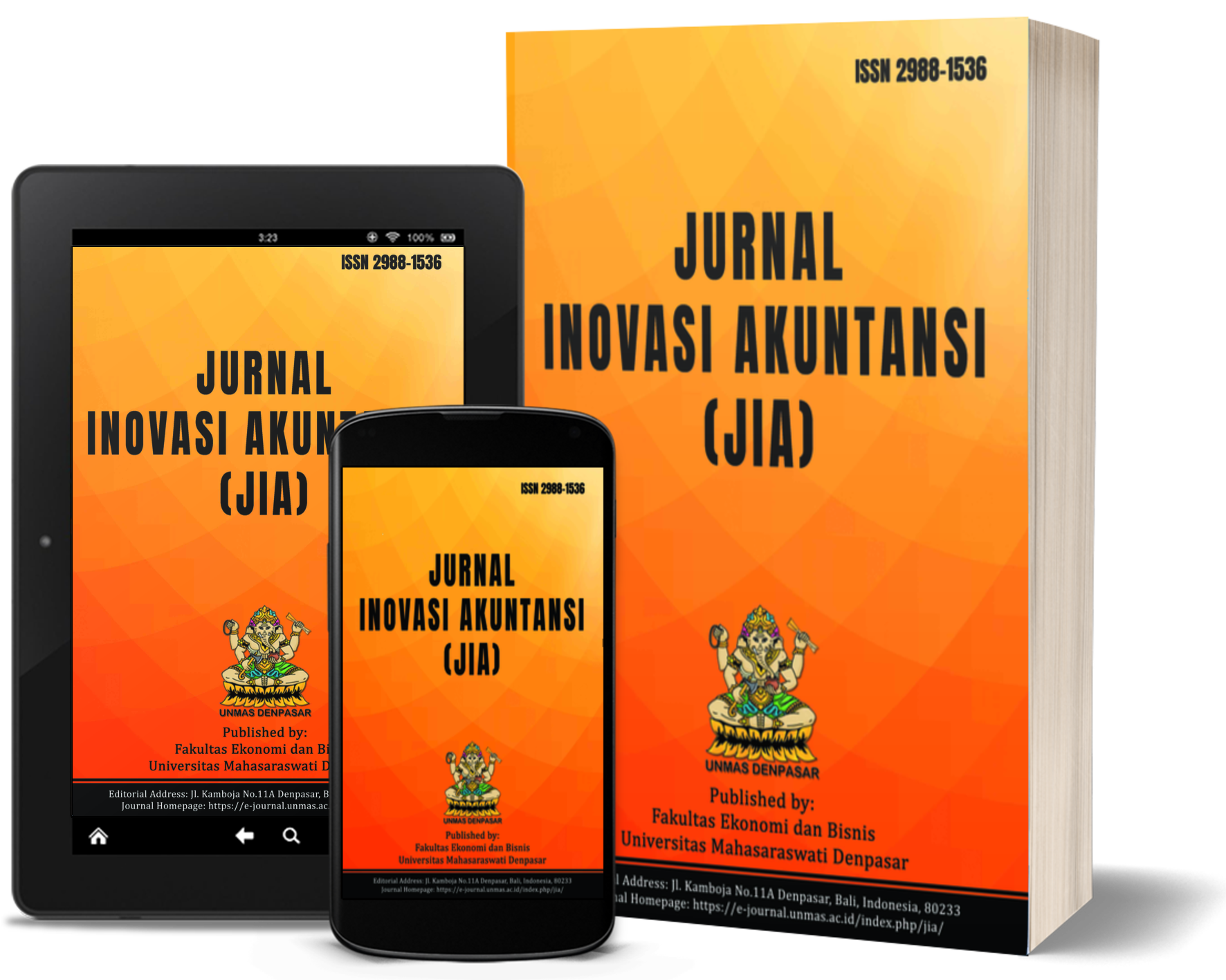Circular Accounting and Regenerative Business Models: How Environmental Foresight Drives SME Competitive Advantage Through Dynamic Capabilities
DOI:
https://doi.org/10.36733/jia.v3i1.11539Keywords:
Business Model Innovation, Circular Economy, Dynamic Capabilities, SME Competitiveness, Sustainable TransitionAbstract
This study aims to investigate the critical role of circular economy capabilities in enhancing SME competitiveness by developing an integrated theoretical framework that bridges dynamic capabilities theory with circular economy principles. Employing a rigorous quantitative research design, the study collected comprehensive data from SMEs operating across multiple industrial sectors in Indonesia. Advanced structural equation modeling techniques were applied to analyze the complex relationships between circular economy capabilities and competitive performance outcomes, while controlling for relevant contextual factors. This methodological approach ensures a robust examination of both direct effects and mediating mechanisms. The findings reveal that circular accounting literacy and regenerative business orientation enhance competitiveness through distinct pathways, with strategic environmental foresight playing a differential mediating role. Moreover, the study makes several novel contributions by developing an integrated capability framework for circular economy implementation, establishing circular accounting literacy as a fundamental SME competency, and demonstrating how specific capability configurations influence sustainable performance outcomes. These insights significantly advance both theoretical understanding and practical strategies for adopting circular business models within the SME sector.
References
Alkhuzaim, L., Zhu, Q., & Sarkis, J. (2021). Evaluating Emergy Analysis at the Nexus of Circular Economy and Sustainable Supply Chain Management. Sustainable Production and Consumption, 25, 413–424. https://doi.org/https://doi.org/10.1016/j.spc.2020.11.022
Aranda-Usón, A., Scarpellini, S., & Moneva, J. M. (2024). Dynamic capabilities for a “circular accounting” and material flows in a circular economy. Resources, Conservation and Recycling, 209, 107756. https://doi.org/https://doi.org/10.1016/j.resconrec.2024.107756
Arjaliès, D.-L., Michelle, R., & and Romi, A. M. (2023). “Come play with us!” A grassroots research agenda for accounting and the circular economy. Accounting Forum, 47(4), 497–524. https://doi.org/10.1080/01559982.2023.2269747
Asante-Darko, D., Dadzie, S. A., Kwarteng, A., Agbodjah, S., & Aryee, T. E. (2024). Effects of Circular Economy Practices and Accounting Innovations on Sustainable Development Goals. Circular Economy and Sustainability, 4(4), 3059–3092. https://doi.org/10.1007/s43615-024-00468-1
Bari, N., Chimhundu, R., & Chan, K. C. (2022). Dynamic Capabilities to Achieve Corporate Sustainability: A Roadmap to Sustained Competitive Advantage. Sustainability (Switzerland), 14(3). https://doi.org/10.3390/su14031531
Centobelli, P., Cerchione, R., Chiaroni, D., Vecchio, P. Del, & Urbinati, A. (2020). Designing business models in circular economy: A systematic literature review and research agenda. Business Strategy and The Environment, 29, 1734–1749. https://api.semanticscholar.org/CorpusID:212990564
De Angelis, R. (2022). Circular Economy Business Models: a Repertoire of Theoretical Relationships and a Research Agenda. Circular Economy and Sustainability, 2(2), 433–446. https://doi.org/10.1007/s43615-021-00133-x
Di Vaio, A., Hasan, S., Palladino, R., & Hassan, R. (2023). The transition towards circular economy and waste within accounting and accountability models: a systematic literature review and conceptual framework. Environment, Development and Sustainability, 25(1), 734–810. https://doi.org/10.1007/s10668-021-02078-5
Du Rietz, S. (2024). Accounting for GDP– A study of epistemic strategies when calculating the quarterly economy. Accounting, Organizations and Society, 112, 101522. https://doi.org/https://doi.org/10.1016/j.aos.2023.101522
Geissdoerfer, M., Pieroni, M. P. P., Pigosso, D. C. A., & Soufani, K. (2020). Circular business models: A review. Journal of Cleaner Production, 277, 123741. https://doi.org/https://doi.org/10.1016/j.jclepro.2020.123741
Gonçalves, B. de S. M., de Carvalho, F. L., & Fiorini, P. de C. (2022). Circular Economy and Financial Aspects: A Systematic Review of the Literature. Sustainability (Switzerland), 14(5). https://doi.org/10.3390/su14053023
Haarhaus, T., & Liening, A. (2020). Building dynamic capabilities to cope with environmental uncertainty: The role of strategic foresight. Technological Forecasting and Social Change, 155, 120033. https://doi.org/https://doi.org/10.1016/j.techfore.2020.120033
Hultberg, E., & Pal, R. (2021). Lessons on business model scalability for circular economy in the fashion retail value chain: Towards a conceptual model. Sustainable Production and Consumption, 28, 686–698. https://doi.org/https://doi.org/10.1016/j.spc.2021.06.033
Järvenpää, A. M., Kuuntu, I., & Mäntyneva, M. (2020). Using foresight to shape future expectations in circular economy SMEs. Technology Innovation Management Review, 10(7), 41–50. https://doi.org/10.22215/timreview/1374
Khan, T. (2024). Circular-ESG Model for Regenerative Transition. In Sustainability (Vol. 16, Issue 17). https://doi.org/10.3390/su16177549
Konietzko, J., Das, A., & Bocken, N. (2023). Towards regenerative business models: A necessary shift? Sustainable Production and Consumption, 38, 372–388. https://doi.org/https://doi.org/10.1016/j.spc.2023.04.014
Mele, G., Capaldo, G., Secundo, G., & Corvello, V. (2024). Revisiting the idea of knowledge-based dynamic capabilities for digital transformation. Journal of Knowledge Management, 28(2), 532–563. https://doi.org/10.1108/JKM-02-2023-0121
Mondal, S., Singh, S., & Gupta, H. (2023). Green entrepreneurship and digitalization enabling the circular economy through sustainable waste management - An exploratory study of emerging economy. Journal of Cleaner Production, 422, 138433. https://doi.org/https://doi.org/10.1016/j.jclepro.2023.138433
Pacheco, D. A. de J., Rampasso, I. S., Michels, G. S., Ali, S. M., & Hunt, J. D. (2024). From linear to circular economy: The role of BS 8001:2017 for green transition in small business in developing economies. Journal of Cleaner Production, 439, 140787. https://doi.org/https://doi.org/10.1016/j.jclepro.2024.140787
Salvador, R., Barros, M. V., Luz, L. M. da, Piekarski, C. M., & de Francisco, A. C. (2020). Circular business models: Current aspects that influence implementation and unaddressed subjects. Journal of Cleaner Production, 250, 119555. https://doi.org/https://doi.org/10.1016/j.jclepro.2019.119555
Scarpellini, S., Marín-Vinuesa, L. M., Aranda-Usón, A., & Portillo-Tarragona, P. (2020). Dynamic capabilities and environmental accounting for the circular economy in businesses. Sustainability Accounting, Management and Policy Journal, 11, 1129–1158. https://api.semanticscholar.org/CorpusID:211255841
Semke, L. M., & Tiberius, V. (2020). Corporate Foresight and Dynamic Capabilities: An Exploratory Study. Forecasting, 2(2), 180–193. https://doi.org/10.3390/forecast2020010
Silvério, A. C., Ferreira, J., Fernandes, P. O., & Dabić, M. (2023). How does circular economy work in industry? Strategies, opportunities, and trends in scholarly literature. Journal of Cleaner Production, 412, 137312. https://doi.org/https://doi.org/10.1016/j.jclepro.2023.137312
Suchek, N., Fernandes, C. I., Kraus, S., Filser, M., & Sjögrén, H. (2021). Innovation and the circular economy: A systematic literature review. Business Strategy and the Environment. https://api.semanticscholar.org/CorpusID:236397799
Taleb, M. A., & Al Farooque, O. (2021). Towards a circular economy for sustainable development: An application of full cost accounting to municipal waste recyclables. Journal of Cleaner Production, 280, 124047. https://doi.org/https://doi.org/10.1016/j.jclepro.2020.124047
Van Loon, P., Diener, D., & Harris, S. (2021). Circular products and business models and environmental impact reductions: Current knowledge and knowledge gaps. Journal of Cleaner Production. https://api.semanticscholar.org/CorpusID:233420409
Vásquez, P., Gallego, V., & Soto, J. D. (2024). Transforming MSMEs towards circularity: an attainable challenge with the appropriate technologies and approaches. Environment Systems and Decisions, 44(3), 624–644. https://doi.org/10.1007/s10669-023-09961-8
Zwiers, J., Melanie, J.-E., & and Hofmann, F. (2020). Circular literacy. A knowledge-based approach to the circular economy. Culture and Organization, 26(2), 121–141. https://doi.org/10.1080/14759551.2019.1709065.
Downloads
Published
How to Cite
Issue
Section
License
Copyright (c) 2025 Iman Supriadi, Rahma Ulfa Maghfiroh, Rukhul Abadi

This work is licensed under a Creative Commons Attribution 4.0 International License.








